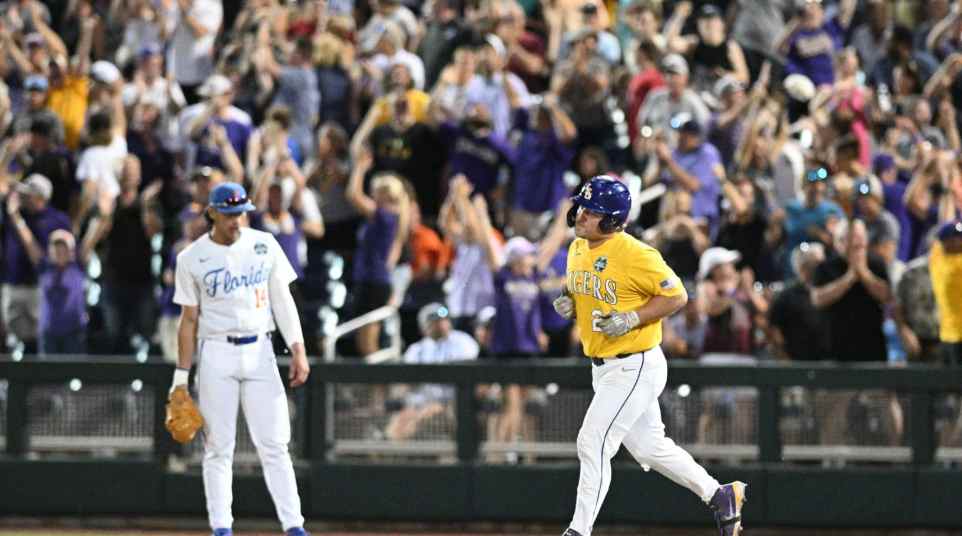
College World Series: Florida finally finds itself on the wrong end of 1-run magic
With the newest piece of evidence before us, it’s now clear that Florida is capable of playing in 1-run games until the end of time. Or until the end of the 2023 season, at least.
But thanks to a new twist, that season is on the brink.
For the first time in this College World Series, the Gators actually lost a 1-run game — a 4-3, 11-inning decision to SEC rival LSU.
And with it, Florida learned the same lesson it taught Virginia, Oral Roberts and TCU in Omaha.
Dang, that hurts.
Especially when you’re robbed by an outfielder making a ridiculous catch.
Baseball often gives and takes in equal proportion. So it was fitting that just 4 days after Michael Robertson sent the Gators to the CWS Finals with a remarkable game-winning catch against the centerfield wall, LSU left fielder Josh Pearson returned the robbery.
With a last-second adjustment, Pearson leaped up to snare a 112-mph rocket off the bat of Wyatt Langford in the bottom of the 10th inning.
Josh Pearson with the game saving grab! pic.twitter.com/0M22KJwnEG
— Stephen Schoch (@bigdonkey47) June 25, 2023
If Pearson mistimed the jump, or showed up a step later, or had Langford’s line drive gotten another 6 inches underneath it, the Gators would be celebrating their 4th-straight 1-run win in Omaha.
Instead, it’s the Tigers who are now on an unusual Omaha winning streak — 2 straight wins courtesy of extra-inning home runs.
Never have the margins at the College World Series felt as narrow as they’ve been this year. Of the 14 games played, 9 have been decided by a run or gone to extra innings.
And though Florida is in bounce-back mode for the first time in the CWS, it’s not the first time the Gators have found themselves in this position in the 2023 postseason.
Texas Tech sent Florida into the loser’s bracket in (of course) a 1-run game in the second round of regionals. The Gators then blasted the Red Raiders by scores of 7-1 and 6-0 to resume their course to Omaha.
That is precisely the experience this team has to draw from now.
“We can’t let this leak into [Sunday],” Gators coach Kevin O’Sullivan said following Saturday night’s loss.
He’s right. Because there’s plenty to be troubled by about Saturday’s performance.
A study in plate discipline
The media spotlight in this College World Series has shone most brightly on LSU ace Paul Skenes, and deservedly so. He is hands down the best college pitching prospect since San Diego State’s Stephen Strasburg in 2009 and has backed it up all postseason.
The Gators appeared to dodge a missile when LSU needed to go the long way to eliminate No. 1 seed Wake Forest in the semifinals. The Tigers were forced to use Skenes in Thursday night’s elimination game against the Demon Deacons. He’ll only be back if needed out of the bullpen on Monday.
Florida has its entire staff available. The Gators had the luxury of using ace Brandon Sproat while LSU needed to get a top-tier performance out of No. 2 starter Ty Floyd.
Floyd didn’t just match Sproat. He matched Skenes. And he topped Skenes, Roger Clemens, and practically every other great pitcher who has ever played in the CWS with 17 strikeouts.
Most strikeouts in a CWS game by 1 pitcher
20 Steve Arlin, Ohio State vs. Washington State in 1965 (in 15 innings)
17 Ed Bane, Arizona State vs. Oklahoma in 1972
17 Ty Floyd, LSU vs. Florida today.
— Rob Anderson (@_robanderson) June 25, 2023
Floyd didn’t end up as 1 of 3 people in the 76-year history of the College World Series to accomplish a feat without some help, though. And that’s the most concerning part of Florida’s performance.
Kevin O’Sullivan said his team chased a lot of fastballs up by Ty Floyd:
“It's combination things— we got a game plan coming in… you look back and there were some swings with two strikes that were maybe a little bit too big, swings that we hadn't taken in the past, or in a…
— Leah Vann (@LVann_Sports) June 25, 2023
One presumes LSU’s pitching staff will try attacking Florida’s hitters in a similar manner in Game 2 until the Gators can make them pay. The Gators need more plate discipline against lefty Nate Ackenhausen and anyone else LSU is able to throw at them.
A hyper-aggressive 2-strike approach wasn’t Florida’s only problem, though.
In some ways it’s miraculous this game ever reached extra innings. LSU literally left enough men on base to fill an entire army platoon — 17.
Fortunately for Florida, the Tigers couldn’t hit a lick once one of their teammates reached base. LSU went 1-for-12 with runners in scoring position.
But if LSU continues to be the more disciplined team at the plate, it will continue creating those opportunities. And if that happens, eventually the dam is going to break.
Despite all those strikeouts, LSU’s pitchers threw only 168 pitches compared to Florida’s 215. That’s a 47-pitch difference. Each represents an additional chance LSU gave itself to win the game.
Perhaps the Gators can force a Game 3 without making up that disparity. Winning 2 games, though, feels unlikely with such a formula. That detail is what the remainder of this series will boil down to.
If Florida doesn’t force LSU’s pitching staff to work a little harder, the championship trophy isn’t coming to Gainesville.
